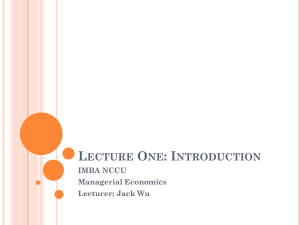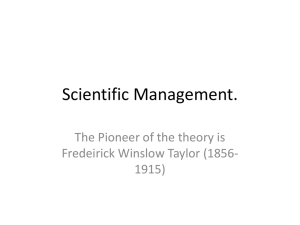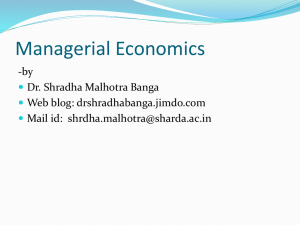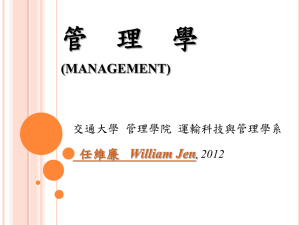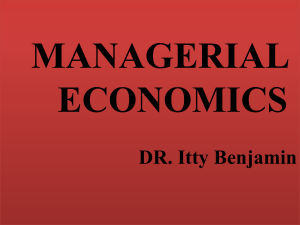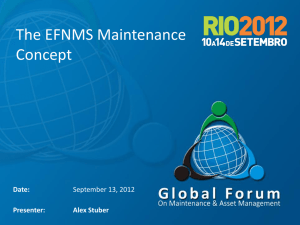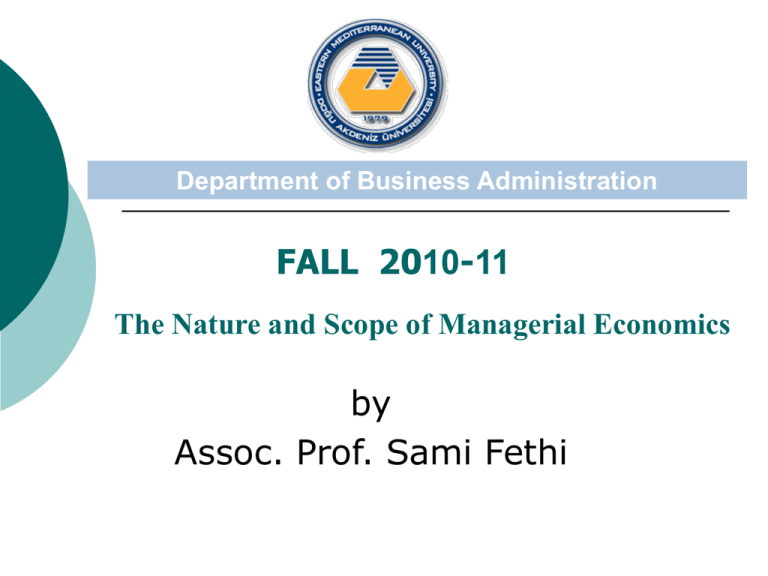
Department of Business Administration
FALL 2010-11
The Nature and Scope of Managerial Economics
by
Assoc. Prof. Sami Fethi
Ch 1: The nature and scope of Managerial Economics
Outline: What You Will Learn . . .
Definition of Managerial Economics
Examine the Theory of the Firm
The Nature of Profits
Business Ethics
The International Framework of Managerial
Economics
Managerial Economics and the Internet
2
© 2004, Managerial Economics, Dominick Salvatore
© 2010/11, Sami Fethi, EMU, All Right Reserved.
Ch 1: The nature and scope of Managerial Economics
Managerial Economics Defined
The application of economic theory
and the tools of decision science to
examine how an organization can
achieve its aims or objectives most
efficiently.
The meaning of this definition can
be best examined with aid of figure
below:
3
© 2004, Managerial Economics, Dominick Salvatore
© 2010/11, Sami Fethi, EMU, All Right Reserved.
Ch 1: The nature and scope of Managerial Economics
Managerial Decision Problems
Economic theory
Microeconomics
Macroeconomics
Decision Sciences
Mathematical Economics
Econometrics
MANAGERIAL ECONOMICS
Application of economic theory
and decision science tools to solve
managerial decision problems
OPTIMAL SOLUTION TO
MANAGERIAL DECISION PROBLEMS
4
© 2004, Managerial Economics, Dominick Salvatore
© 2010/11, Sami Fethi, EMU, All Right Reserved.
Ch 1: The nature and scope of Managerial Economics
Managerial Decision Problems:
Managerial decision problems arise in any
organization (i.e. non-profit organization such
as a hospital or a university or government
agency), when they seek to achieve some goal
or objective subject to limitations on the
availability of essential inputs and in the face of
legal constraints.
5
© 2004, Managerial Economics, Dominick Salvatore
© 2010/11, Sami Fethi, EMU, All Right Reserved.
Ch 1: The nature and scope of Managerial Economics
Managerial Decision Problems:
o
Case of Hospital:
A ohospital may seek to treat as patients as possible at an
adequate medical standard with its limited physical resources
(i.e. physicians, technicians, nurses, equipment, beds etc.)
and budget.
o
Case of University:
The goal of a state university may provide an adequate
education to as student as possible subject to the physical
and financial constraints it faces.
o
Case of government agency
Similarly, a government agency may investigate to provide
a particular service to as many people as possible the lowest
feasible cost.
© 2004, Managerial Economics, Dominick Salvatore
© 2010/11, Sami Fethi, EMU, All Right Reserved.
6
Ch 1: The nature and scope of Managerial Economics
Managerial Decision Problems:
In all these cases, the relevant
organizations face management decision
problems as it seek to accomplish their own
goals or objective subject to the constraint
they face.
It is important to note that the goals and
constraints may differ from case to case,
however the basic decision-making process
is the same.
7
© 2004, Managerial Economics, Dominick Salvatore
© 2010/11, Sami Fethi, EMU, All Right Reserved.
Ch 1: The nature and scope of Managerial Economics
Economic Theory:
Relationship to Economic Theory:
The organization can solve its management
decision problems by application of economic
theory and the tools of decision science.
Economic Theory refers to microeconomics
and macroeconomics. Economic theories seek
to predict and explain economic behaviour
based on a model.
8
© 2004, Managerial Economics, Dominick Salvatore
© 2010/11, Sami Fethi, EMU, All Right Reserved.
Ch 1: The nature and scope of Managerial Economics
Microeconomics:
This subject is the study of the
economic behaviour of individuals
decision-making
units
such
as
individual
consumers,
resources
owners and business firm in the free
enterprise system.
9
© 2004, Managerial Economics, Dominick Salvatore
© 2010/11, Sami Fethi, EMU, All Right Reserved.
Ch 1: The nature and scope of Managerial Economics
Macroeconomics:
On the other hand, this subject is the
study of the total or aggregate level
of output, income, employment,
consumption, investment and prices
for the economy viewed as a whole.
10
© 2004, Managerial Economics, Dominick Salvatore
© 2010/11, Sami Fethi, EMU, All Right Reserved.
Ch 1: The nature and scope of Managerial Economics
Microeconomic theory of firm
Although the microeconomic theory of
firm is the single most important
element in the managerial economics,
the general macroeconomic conditions
of the economy (i.e. the level of
aggregate demand, rate of inflation,
and interest rate) in which the firm
operates are also very important.
11
© 2004, Managerial Economics, Dominick Salvatore
© 2010/11, Sami Fethi, EMU, All Right Reserved.
Ch 1: The nature and scope of Managerial Economics
The theory of firm
The theory of firm assumes that the
firm seeks to maximize profits and
minimize cost and on the basis of that
it predicts how much of a particular
commodity the firm should produce
under different forms of market
structure or organization.
12
© 2004, Managerial Economics, Dominick Salvatore
© 2010/11, Sami Fethi, EMU, All Right Reserved.
Ch 1: The nature and scope of Managerial Economics
Theory of the Firm
Combines and organizes resources for the purpose
of producing goods and/or services for sale.
Internalizes
transactions, reducing transactions
costs.
Primary goal is to maximize the wealth or value of the firm.
13
© 2004, Managerial Economics, Dominick Salvatore
© 2010/11, Sami Fethi, EMU, All Right Reserved.
Ch 1: The nature and scope of Managerial Economics
Decision Sciences
Managerial economics is very closely
related to the decision sciences. These
use
the
tools
of
mathematical
economics
and
econometrics
to
construct and estimate decision models
aimed at determining the optimal
behavior of the firm (i.e. how the firm
can achieve its goals most efficiently).
14
© 2004, Managerial Economics, Dominick Salvatore
© 2010/11, Sami Fethi, EMU, All Right Reserved.
Ch 1: The nature and scope of Managerial Economics
Mathematical Economics and Econometrics
Mathematical Economics especially is used to
formalize (i.e. express in equational form) the
economic model postulated by economic theory.
Econometrics applies statistical tools (i.e.
regression analysis) to real world data to estimate
the models postulated by economic theory and for
forecasting.
15
© 2004, Managerial Economics, Dominick Salvatore
© 2010/11, Sami Fethi, EMU, All Right Reserved.
Ch 1: The nature and scope of Managerial Economics
Application of economic theory and decision science
tools to solve managerial decision problems
Example:
Economic theory postulates that the quantity demanded
(Q) of a commodity is a function of the price the
commodity (P), the income of consumers (Y), and the
price of related (i.e. complementary and substitute)
commodities (PC and PS) respectively. So we may
postulate the following formal model:
Q= f (P,Y, PC, PS)
The Theory says:
Qd=f (P, I, PR, T, PE, N)
-, +/-, +/-,+, +, +
N/I, S/C
16
© 2004, Managerial Economics, Dominick Salvatore
© 2010/11, Sami Fethi, EMU, All Right Reserved.
Ch 1: The nature and scope of Managerial Economics
Cont..
We can estimate this empirical relationship by
collecting data on the variables mentioned in the
equation above. This will permit the firm to
determine how much Q would change in P, Y, PC and
PS and to forecast the future demand for the
commodity. This information is essential in order for
management to achieve the goal or objective of the
firm (profit maximization) most efficiently.
17
© 2004, Managerial Economics, Dominick Salvatore
© 2010/11, Sami Fethi, EMU, All Right Reserved.
Ch 1: The nature and scope of Managerial Economics
OPTIMAL SOLUTION TO MANAGERIAL DECISION PROBLEMS:
Theory of the firm
A firm is an organization that Combines
and organizes resources for the purpose of
producing goods and/or services for sale.
For instance; there are millions of firms in the United
States. These include proprietorship (i.e. firms owned
by one individual), partnership and corporations (i.e.
owned by stockholders). Firms produce more than 80
percent of all good and services consumed in the U.S.A.
The remainder is produced by the government and non
profit organizations such as private college, hospitals,
museums and foundations.
18
© 2004, Managerial Economics, Dominick Salvatore
© 2010/11, Sami Fethi, EMU, All Right Reserved.
Ch 1: The nature and scope of Managerial Economics
Internalizes transactions, reducing transactions costs
Firms exist because it would be very inefficient and
costly for entrepreneurs to enter into and enforce
contracts with workers and owners of capital, land
and the other resources for each separate step of
production and distribution process. Instead,
entrepreneurs enter into long term and broader
contracts with labor to perform a number of tasks
for a specific wages and fringe benefit.
19
© 2004, Managerial Economics, Dominick Salvatore
© 2010/11, Sami Fethi, EMU, All Right Reserved.
Ch 1: The nature and scope of Managerial Economics
Internalizes transactions, reducing transactions costs
This kind of contract is much less costly than
numerous specific contracts and is highly
advantageous both to entrepreneurs and to the
workers and the other resource owners. The firm
exists in order to save on such transaction costs. By
performing many functions within the firm, the
firm also saves on sales taxes and avoids price
controls and other government regulations that
apply only to transactions among firms. This is
called internalizing transactions. Primary goal is to
maximize the wealth or value of the firm.
20
© 2004, Managerial Economics, Dominick Salvatore
© 2010/11, Sami Fethi, EMU, All Right Reserved.
Ch 1: The nature and scope of Managerial Economics
Value of the Firm
The present value of all expected future profits
21
© 2004, Managerial Economics, Dominick Salvatore
© 2010/11, Sami Fethi, EMU, All Right Reserved.
Ch 1: The nature and scope of Managerial Economics
Alternative Theories
Sales maximization
Management utility maximization
Adequate rate of profit
Principle-agent problem
Satisficing behavior
22
© 2004, Managerial Economics, Dominick Salvatore
© 2010/11, Sami Fethi, EMU, All Right Reserved.
Ch 1: The nature and scope of Managerial Economics
Alternative Theories
The theory of firm has also been criticized as
being much narrow and unrealistic. For this
reason, broader theories of the firm have been
proposed. The most prominent among these are
models postulate that the primary objective of
the firm is the maximization of sales, the
maximization of management utility and
satisfying behavior.
23
© 2004, Managerial Economics, Dominick Salvatore
© 2010/11, Sami Fethi, EMU, All Right Reserved.
Ch 1: The nature and scope of Managerial Economics
Sales Maximization
According to the model, managers of modern
corporations seek to maximize sales after an
adequate rate of profit has been earned to
satisfy stockholder ( this model introduced by
William Baumol).
24
© 2004, Managerial Economics, Dominick Salvatore
© 2010/11, Sami Fethi, EMU, All Right Reserved.
Ch 1: The nature and scope of Managerial Economics
Management utility maximization
The model (introduced by Oliver Williamson)
postulates that with the advent of the modern
corporation and resulting separation of management
from ownership.
Managers are more interested in maximizing their
utility measured in terms of their compensation (i.e.
salaries, stock options etc.), the size of their staff,
extent of control over the corporation, lavish offices
etc. than maximizing corporate profits. This referred
to as the Principle-agent problem.
25
© 2004, Managerial Economics, Dominick Salvatore
© 2010/11, Sami Fethi, EMU, All Right Reserved.
Ch 1: The nature and scope of Managerial Economics
Satisficing behavior
This stems from the great complexity of running
the large modern corporation- a task often
complicated by uncertainty and a lack of
adequate data. Manager are not able to maximize
profits but can only strive for some satisfactory
goal in terms of sales, profit, growth, market
share and so on. This situation is called
satisficing behaivour.
26
© 2004, Managerial Economics, Dominick Salvatore
© 2010/11, Sami Fethi, EMU, All Right Reserved.
Ch 1: The nature and scope of Managerial Economics
Definitions of Profit
Business Profit: Total revenue minus
the explicit or accounting costs of
production.
Economic Profit: Total revenue
minus the explicit and implicit costs
of production.
Opportunity Cost: Implicit value of a
resource in its best alternative use.
27
© 2004, Managerial Economics, Dominick Salvatore
© 2010/11, Sami Fethi, EMU, All Right Reserved.
Ch 1: The nature and scope of Managerial Economics
The Explicit and Implicit costs
The explicit or accounting costs: are the actual out of
pocket expenditures of the firm to purchase or hire
inputs it requires in production. (i.e. wages to hire
labour, interest on borrowed capital, rent on land and
buildings and the expenditure on raw materials).
The Implicit costs: refers to the value of the inputs
owned and used by the firm in its own production
processes.
28
© 2004, Managerial Economics, Dominick Salvatore
© 2010/11, Sami Fethi, EMU, All Right Reserved.
Ch 1: The nature and scope of Managerial Economics
Theories of Profit
Risk-Bearing Theories of Profit
Frictional Theory of Profit
- Profit stems from disturbances from long-run equilimrium
-Normal return adjusted for risk or zero profit
- Energy crises in 1970s-large profit by providing insulation materials
- Decline in oil prices in mid 1980s- losses are incurred
Monopoly Theory of Profit
Innovation Theory of Profit
- Profit is the reward for the introduction of a successful innovation
- e.g Steven Job, the founder of the Apple comp. Company became a
millonaire in 1977
- successful innovation encourage the flow of technology as well as profit
Managerial Efficiency Theory of Profit
29
© 2004, Managerial Economics, Dominick Salvatore
© 2010/11, Sami Fethi, EMU, All Right Reserved.
Ch 1: The nature and scope of Managerial Economics
Function of Profit
Profit is a signal that guides the allocation of
society’s resources.
High profits in an industry are a signal that
buyers want more of what the industry
produces.
Low (or negative) profits in an industry are a
signal that buyers want less of what the
industry produces.
30
© 2004, Managerial Economics, Dominick Salvatore
© 2010/11, Sami Fethi, EMU, All Right Reserved.
Ch 1: The nature and scope of Managerial Economics
Business Ethics
Identifies types of behavior that businesses
and their employees should not engage in.
Source of guidance that goes beyond
enforceable laws.
31
© 2004, Managerial Economics, Dominick Salvatore
© 2010/11, Sami Fethi, EMU, All Right Reserved.
Ch 1: The nature and scope of Managerial Economics
The Changing Environment of Managerial Economics
Globalization of Economic Activity
Goods and Services
Capital
Technology
Skilled Labor
Technological Change
–Telecommunications Advances
–The Internet and the World Wide Web
32
© 2004, Managerial Economics, Dominick Salvatore
© 2010/11, Sami Fethi, EMU, All Right Reserved.
Ch 1: The nature and scope of Managerial Economics
Theory of firm-Value of the firm
Example for the trade-off between profit and costs
A person managing a dry- cleaning storestable for $ 30,000 per
year decides to open a new one. The revenues of the store during
the first year of operation are $ 100,000 and the expenses are $
10,000 for supplies, $ 35,000 for salaries, $ 8,000 for rent, and $
2,000 for utilities. The person also used $5,000 for interest on a
bank loan. Assume that income and business taxes are zero and
the repayment of the principal of the loan does not start before
three years (suppose r=10%).
Calculate (a) the explicit cost (b) the implicit costs (c) the
business profit, (d) the Economic profit (e) normal return on
investment and also (f) indicate whether the person should open
the dry-cleaning store.
33
© 2004, Managerial Economics, Dominick Salvatore
© 2010/11, Sami Fethi, EMU, All Right Reserved.
Ch 1: The nature and scope of Managerial Economics
Example for the trade-off between profit and costs -Value of the firm
(a) Expenses is the explicit costs- the expenses are $ 10,000 for supplies, $
35,000 for salaries, $ 8,000 for rent, and $ 2,000 for utilities as well as
interest $ 5,000 – total amout is $ 60,000.
(b) The Implicit costs are the entrepreneeur’s foregone salary- $ 30,000.
(c) the business profit= total revenues - the explicit costs = $ 100,000 - $ 60,000=
$ 40,000
(d) the Economic profit= total revenues – (the explicit costs + Implicit costs) =
100,000 – ($ 60,000 + $ 30,000) = $ 10,000
(e) normal return on investment = The Implicit costs =$ 30,000.
(f) PV=10,000/1+0.10)....or roughly we can say that The person would earn
economic profit $ 10,000 per year, therefore, the person should open the
store..
34
© 2004, Managerial Economics, Dominick Salvatore
© 2010/11, Sami Fethi, EMU, All Right Reserved.
Ch 1: The nature and scope of Managerial Economics
The End
Thanks
35
© 2004, Managerial Economics, Dominick Salvatore
© 2010/11, Sami Fethi, EMU, All Right Reserved.

